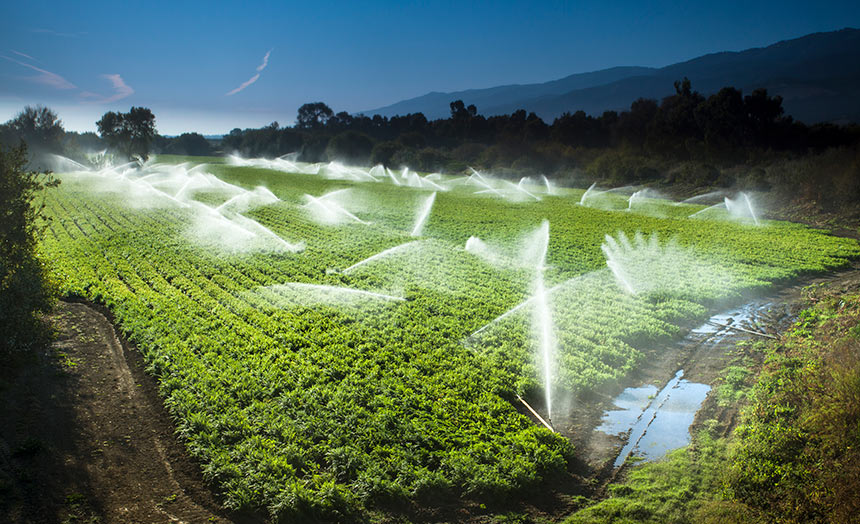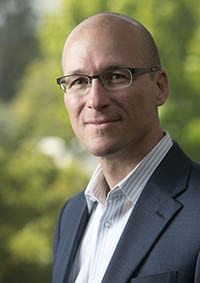
By Gwyneth K. Shaw
California’s tremendous thirst for water poses a grave challenge to its future, from an everyday perspective and in the longer battle of combating climate change — and is a bellwether for the rest of America and the world. At Berkeley Law’s Center for Law, Energy & the Environment (CLEE), protecting existing resources while exploring innovative solutions for the future is a key component of its larger mission.
Michael Kiparsky, founding director of CLEE’s Wheeler Water Institute, and his team have spent years working on water policy, often in partnership with researchers from other branches of the University of California system. Together, they’ve helped guide changes at the local and state level, particularly when it comes to the legal challenges of crafting rules for a resource that’s inherently difficult to control and in high demand.
Recently, a CLEE team — including researchers from elsewhere at UC Berkeley and from UC Davis, Santa Cruz, and UC College of the Law, San Francisco — got the chance to take its longstanding policy work national. Kiparsky is the lead investigator on a $2 million grant from the United States Environmental Protection Agency (EPA) to assist efforts to recharge aquifers and improve groundwater sustainability.
“This is California offering up our experience and innovation to try and drive innovation elsewhere,” Kiparsky says. “The EPA recognized that we have a cohesive team with a strong track record of doing really good work in this area.”
CLEE is Berkeley Law’s hub for energy and environmental law and policy, with four main spheres of focus: climate, water, oceans, and land use. Drawing on experts across the UC Berkeley campus, the center crafts pragmatic, creative policy solutions to build a more resilient and sustainable world.
The work Kiparsky and his team are doing marks just one example of how CLEE is developing interdisciplinary solutions to build innovative and resilient water systems, Executive Director Louise Bedsworth says.
“Working across the system’s complex governance, finance, and technical dimensions, this is an opportunity to leverage their knowledge, expertise, and partnerships to implement groundwater recharge activities in other geographies and landscapes,” she says.
Restoring our aquifers
The ground beneath our feet holds a significant portion of the Earth’s water and is a critical source for people worldwide. California and other states where water is scarce have long tapped more groundwater — particularly for agriculture — than goes back in through the natural recharge process, in which water from rivers, lakes, streams, wetlands, snowmelt, and rain flows into the ground.
Groundwater deficits have other implications, too: they can degrade water quality, and when the pores in the rocks, gravel, and soil we walk overare empty, the earth’s surface can sink. This damage can be permanent, making aquifers unsuitable for groundwater storage and compounding the problem.

“We made a mess of this system,” Kiparsky says. “In order to manage groundwater better, you can do two things: Pump less of it, or add more water to the ground. Really, both are necessary.”
The idea of adding water back, known as enhanced aquifer recharge, isn’t new, but many questions remain. Among the uncertainties are what to use for the water supply, how to match the best physical techniques to local conditions, and how to navigate the legalities of water storage.
California took a big step forward in 2014 with the passage of the Sustainable Groundwater Management Act. The law aims to protect and restore the state’s groundwater supplies and requires water management agencies to develop sustainability plans for the most at-risk basins — but didn’t offer concrete steps to achieve it.
Enter the CLEE team, which has helped launch pilot programs and bring experts together to advise the more than 260 sustainability agencies that have emerged since the law was enacted. Many, if not most, have identified groundwater recharge as one of the ways they will bring their basins into hydrologic balance.
The new EPA grant is a chance to wield significant influence based on a deep well of research and expertise, Kiparsky says.
“It’s an opportunity to take recharge to a different scale,” he says. “And it lets us do one of the things we do best: synthesis and integration, and the context-specific blending across disciplines that’s targeted at real-world impact.”
The grant’s chief outcome will be a lifecycle map for enhanced recharge, with solutions and pathways outlined to help state and local governments plan their own projects, maximizing benefits and avoiding unintended consequences. Combined with original research to fill key knowledge gaps and extensive engagement with experts and stakeholders, the project seeks to spur adoption and diffusion of enhanced recharge to benefit water systems nationwide.
“There will be an audience that needs this in California,” Kiparsky says. “But our goal is to write this so that it’s useful for entities all around the country, because all of this is going to be relevant everywhere.”
Why recharge?
This landscape presents many legal complexities, Kiparsky says. On a basic level, there are many questions: What’s the source of the water, and does anyone hold a permit to use it? How do you protect the various interests involved, from agricultural water users to animals and plants, as well as the quality of the water?
“Why would a landowner, for example, want to take land out of agricultural production, spend money on bulldozers and monitoring, and clean the infiltration basin in order to put water in the ground? Because if you add more water to the ground, there’s more to use later,” Kiparsky says. “The problem is that both physically and legally, it doesn’t work that way: groundwater basins don’t respect property boundaries. When water goes into the ground, it benefits the basin as a whole.”
If you’re across the road from another farmer who participates in a recharge program, there’s nothing stopping you from drawing off some of that new water and benefiting from your neighbor’s efforts. So it’s hard to figure out how to generate incentives for property owners, Kiparsky says.
“That’s the sort of thing that motivates our involvement here at Berkeley Law,” he says. “This is a regulatory challenge as well as an economic challenge as well as a practical challenge.”
Other hurdles include figuring out where to get the water for recharge. Floodwaters are plentiful when floods happen, but they’re also by nature unpredictable by nature; stormwater presents its own set of legal issues; and highly treated wastewater has been tested in parts of California but also presents potential drawbacks.
Then there’s the geophysical question of how to find the best place to actually put the water in the ground, and the economics of doing so.
Even so, recharge is “a pragmatic and promising solution to an enormous problem,” says UC College of the Law, San Francisco Professor Dave Owen ’02, a researcher on the EPA grant, CLEE board member, and former editor in chief of the student-run Ecology Law Quarterly. Storing more water in the ground isn’t a complete solution to longstanding management problems, he says, but it could really help — and, at least for now, it’s not polarizing.
“So many environmental issues quickly drive people to their ideological corners, and then it’s hard to have a conversation, let alone get anything done,” Owen says. “Enhanced aquifer recharge isn’t like that. It sparks interest from people who have a wide variety of backgrounds and political perspectives.”
Cross-campus collaborations
In addition, CLEE has been a great place for partnerships across academic disciplines and institutions, notes UC Santa Cruz Professor Andrew Fisher, a hydrogeologist who’s also forged a long collaboration with the team. Trust can be hard to come by in these circles, and he’s grateful he and Kiparsky have built such a strong relationship.
“Certainly individual campuses have centers of excellence and critical mass in important areas. But with the whole UC system, we have such a great mix of experience and interests,” Fisher says. “In addition, working successfully on complicated and interdisciplinary projects requires that people have compatible attitudes and approaches — not identical, but covering key areas in ways that help to support the overall effort.”
The team has also drawn from a wide swath of funders in addition to the EPA, including the Gordon and Betty Moore Foundation, the UC Office of the President, the UC Water Security and Sustainability Initiative, the U.S. Department of Agriculture, and the Santa Clara Valley Water District.
Fisher leads a pilot project with the Pajaro Valley Water Management Agency that’s trying out “net metering” of groundwater recharge. It’s similar to a system where you have solar panels on your home and get a credit on your bill for the energy you generate but don’t use.
“Their bill gets credited based on the amount of water that they recharge on these projects. So now you’ve got something very rare: a financial incentive for recharge,” Kiparsky says. “But crucially, it’s not tied to any further use of that water. That incentive ends at the surface.”
This means that the hydrologic benefits can accrue not just to water users, but to the basin and the environment.
Ultimately, groundwater recharge is just one tool in what will have to be a hefty kit in order to combat climate change. In this area and many others, Owen says, CLEE has been at the forefront and will continue to lead.
“I think CLEE’s importance is closely tied to California’s importance,” Owen says. “California really is the most important environmental policy laboratory in the world. And it’s not enough to have big ambitions and broad proclamations; people really need to think hard about how to make the law and policy details work.
“That’s been CLEE’s role. Across a range of policy areas, CLEE has done an excellent job of bringing people together to think through cutting-edge challenges.”